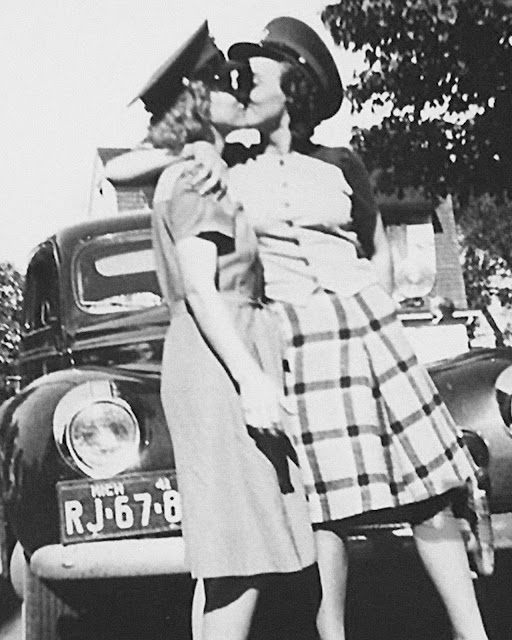"The Lavender Scare" tells the true story of a national endeavor led by President Eisenhower to remove all gays and lesbians from their government posts. This witch-hunt was signed into law on April 27th, 1953 at the height of the Cold War. It's a time in history remembered mostly for the "Red Scare" when communists were being purged from all branches of government. Director/Producer Josh Howard, the Emmy Award-Winner known for producing CBS's 60 minutes, brings this story to light.
The story plays like a noir thriller, but one that had a tragic ending for thousands of gays and lesbians who lost their jobs on account of their sexual orientation. The film is narrated by the illustrious Glenn Close and follows the first-hand accounts of several civil servants who lived through this decades-long endeavor.
We are introduced to Joan Cassidy, a woman who had devoted her life to the Navy. She was being considered for a prestigious honor, one that would have changed history. She would have become the first woman Admiral in the U.S. Navy Reserve. As painful as it was for her, she had to turn down the opportunity of a lifetime for fear of the military learning of her sexual orientation.
In a powerful scene, Joan describes how difficult it was for her to give up her dreams. She says: "I had to give up the possibility of Admiral because I was gay and because I wasn't sure I could hide it well enough. I wanted it so badly. I had wanted it so badly all of my life."
Eisenhower created a task force to secretly investigate and oust gays and lesbians from the government. They were interrogated in private rooms behind closed doors and then punished by the U.S. government after they were deemed a threat to National Security. This discriminatory practice continued on even into the 1980's.
Furthermore, the government went on to procure names of victims' gay or lesbian friends during interrogations and went so far as to require police departments across the country to report on homosexual activity. This led to local communities reporting on their neighbors, family members and friends.
In a chilling account, we learn of a young man named
Andrew "Drew" Ference who worked for the State Department in Foreign Services. He was one of four children born to immigrant parents who had escaped oppression in Eastern Europe and had come to the U.S. to pursue better lives. Drew was adored by his entire family. His State Department work took him to Paris, France where he was soon put under the microscope and investigated for homosexual conduct. His family recalls how he was humiliated and demoralized after the interrogations. His roommate found him in his apartment dead from natural gas poisoning. Authorities ruled the death a suicide.
Author John D'Emilio says: "It was common for many gay men and women not to use their real names even in social circles. They had to be very, very careful."
What I found most fascinating is how different life was for gays and lesbians in Washington D.C. before the Second World War. People were tolerant towards gays and lesbians and the gay community flourished as more and more young gay Americans left rural towns and headed to the Capitol in pursuit of new opportunities during a thriving economy.
After years of silence, finally, one man stood up in opposition to the cruel regime.
Enter Frank Kameny, an astronomer for the Army Map Service (pre-NASA) turned gay-rights advocate who spoke out against the discriminations of gay people in America after he was fired in 1957 under suspicion for homosexuality. from then on, Frank fought for the rights of his fellow gay brothers and sisters by representing many who, like himself, was never given a fair hearing or trial, or due process under the law. In the 1960's Frank successfully held picket lines outside of government buildings advocating for equal rights. He even managed to win cases for homosexual men and women during this discriminatory time in American history. He's also known by many as the father of the gay rights movement.
"The Lavender Scare" is a story that should never be forgotten. It tells the tale of the brave people who fought for the freedoms that gay Americans enjoy today.
Rating: A




Comments
Post a Comment